Hello Spring!
It’s that time of the year. Beautiful weather is finally arriving and for many this signals the start of the season of allergy suffering. Plants are blooming and bringing us layers of pollen and never ending streams of snot. Gorgeous trees lace walkways, while itchy eyes and hives dominate households. The air is filled with fragrance and floating petals, while teary parents and children flood doctor’s waiting rooms. So, let’s dive into 7 natural solutions for allergy season!
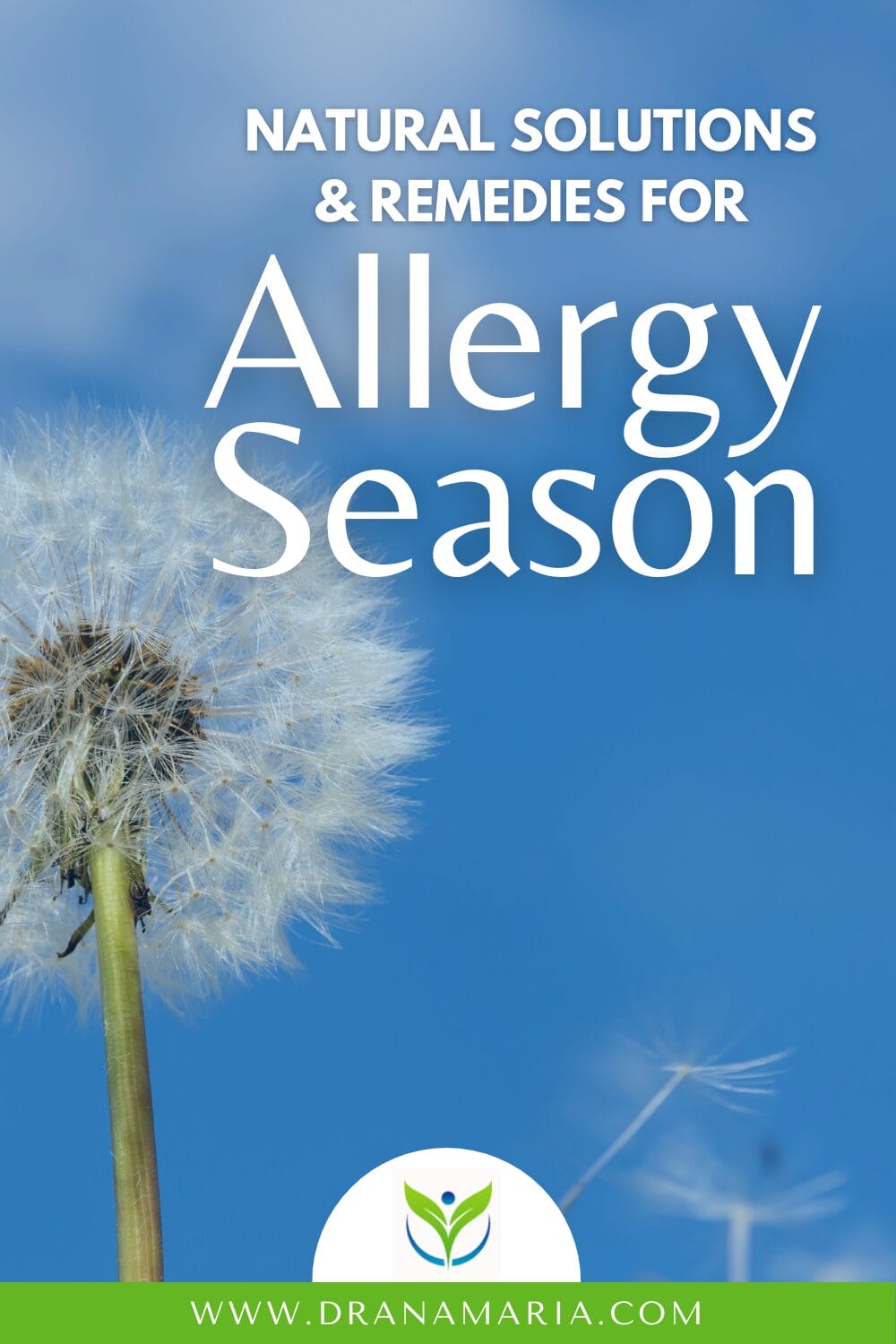
Beware
Failing to cope with hay fever can produce long-term complications. People who have allergic rhinitis tend to have more nasal polyps, ear infections, and sleep disorders, including snoring and sleep apnea. Additionally, untreated hay fever can result in mouth breathing, a dental overbite, and chronic swelling in the nasal passages.
Approximately 80 percent of people with asthma suffer from seasonal allergies. Treating hay fever symptoms can reduce sinus infections, ear infections, asthma–related hospitalizations and emergencies (article). Let’s continue on understanding how to identify seasonal allergies, other lesser known symptoms, other conditions that put you more at risk, and the natural remedies you can implement to support allergies.
Seasonal allergies may show up as:
- Congestion
- Post-nasal drip with night time cough and frequent throat clearing
- Excess mucus production
- Sneezing
- Runny nose
- Itchy, watereyes
- Scratchy throat
- Tickle/irritation in the ears
But allergies can also ONLY show up as:
- Asthma
- Hives
- Eczema
- Middle Ear Infections
- Decreased concentration and focus
- Decreased decision-making
- Exhaustion and sleep issues
- Mood swings
- Irritability
- Headaches
Do not despair!
Here is a guide on how to prepare for pollen season with fewer medications and less doctor visit.
The following conditions can put you at risk for Pollen Allergies.
- asthma
- constipation
- unmanaged stress
- food allergies
- poor nutrition
- lack of exercise
- sleep deficit
- deviated septum
- nasal polyps
- recent trauma or illness
- pregnancy
All these conditions are a signs of inflammation.
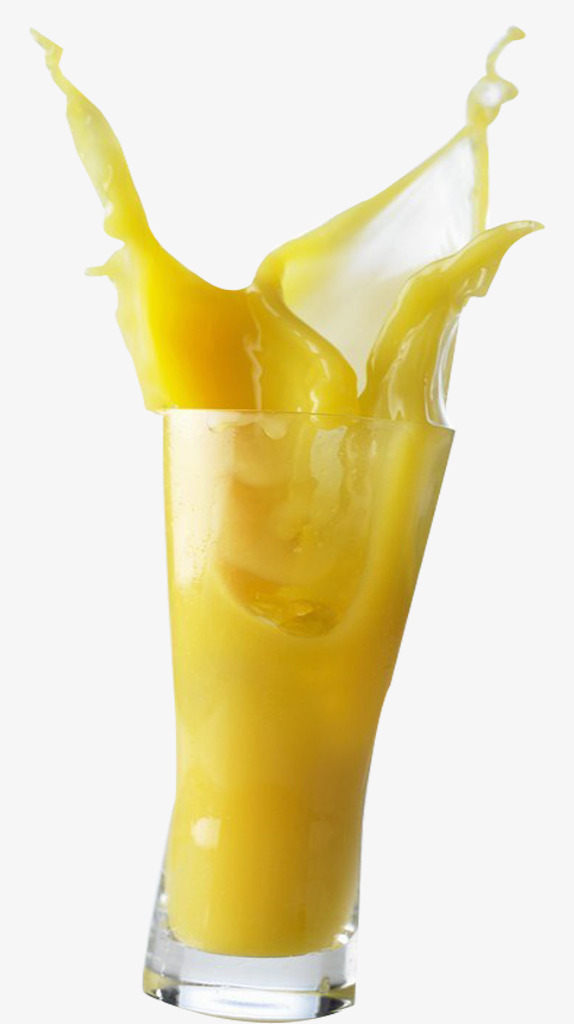
Let’s use the glass of juice analogy.
- The body is the glass. The juice is inflammation. A body battling asthma, eczema, constipation, food allergies is like an overflowing glass of juice. Aka, a body full of inflammation. Allergies to pollen cause more inflammation. Thus when the trees bloom, the glass spills over and horrid allergy symptoms commence.
- However, when the above conditions are addressed and inflammation is lowered, the body will resemble a glass half full of juice. Therefore, this body will be able to handle pollen allergies much better with a lot less symptoms.
Natural Solutions & Remedies for Allergy Season

Natural Remedy #1: Increase your consumption of these foods during allergy season
- fresh fruits: mango, pear, watermelon, apple, kiwi, cantaloupe, grapes, berries
- fresh vegetables, organic when possible, here is the list of the dirty dozen
- dairy substitutes: coconut milk, hemp milk, almond milk, rice milk
- cooking oils: olive oil, coconut oil
- leafy herbs
- organic, free range eggs
- gluten free grains: quinoa, rice, oats
- freshly wild caught fish
- freshly cooked organic poultry
- herbal teas such as Green Tea
The above foods are low histamine foods which means they are least likely to irritate the immune system. They are also power houses of Vitamins such as Vitamin C, Vitamin D, Magnesium, and Antioxidants such as Quercitin.
Natural Remedy#2: Avoid these foods during allergy season
These foods prevent the immune system from working properly. In order to avoid allergy symptoms, we need a strong immune system. One that doesn’t over-react or under-react.
- sugar
- caffeine
- bottled / store bought fruit juices
- food preservatives
- decrease/avoid dairy and gluten
- processed foods with ingredients that you can’t pronounce or have no idea what they mean

Natural Remedy #3: Reduce Your Consumption of Histamine Rich Foods during allergy season
Histamines are compounds that are released by cells in response to an allergic and inflammatory reactions, causing hives, runny nose, anaphylaxis, coughing, etc. The more histamines you have circulating in the body, the less tolerant you will be to pollen, and the more allergy symptoms you will have. Let’s reduce the burden by avoiding/reducing the following foods:
- Priority #1 – Get rid of artificial flavors, colors, and preservatives.
- Chocolate, wine, and strawberries are very high in histamines.
- Avocados, bananas, dairy, eggs, oranges, peaches, pineapples, raspberries, spinach, and tomatoes are also high in histamines but also high in quercetin (see below)
- Fermented foods: sauerkraut, vinegar, soy sauce, kefir, yogurt, kombucha, etc.
- Vinegar-containing foods: pickles, mayonnaise, olives.
- Cured meats: bacon, salami, pepperoni, luncheon meats and hot dogs.
Oral Allergy Syndrome
Natural Remedy #4: Beware of these foods during allergy season
They can cross react and are known triggers in individuals suffering from Pollen Allergies. Eating these foods when these plants bloom may worsen allergy symptoms. (article)
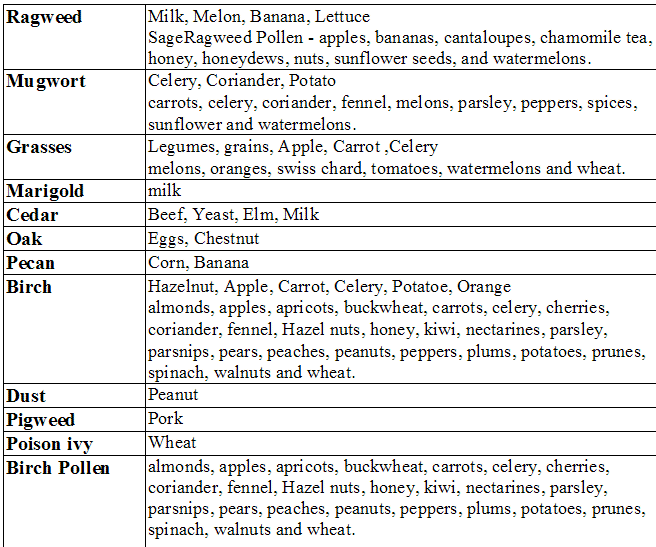
Natural Remedy #5: Reduce your exposure to Pollen during allergy season
- Wear a protective mask when gardening or doing yard work.
- Modify the indoor environment to keep out allergens. Use HEPA (high-efficiency particulate air) filters in air conditioners to better trap pollen spores. Change air condition filters often.
- Check pollen counts before you travel. To find pollen counts, go to the National Allergy Bureau (www.aaaai.org/nab)
- Protect your eyes. Wear sunglasses when outdoors to reduce the amount of pollen coming into the eyes,
- Wash your hair and shower at the end of the day to wash out pollens. This will help avoid pollen transfer to the pillowcase and bedding.
- Exercise in the morning or late in the day. Pollen counts typically are higher on a hot, windy, sunny day compared with a cool day without much wind.
- Check the pets, they are known pollen carriers.
- Leave your shoes at the door. Tracking in mud and pollen through the house will make symptoms worse. (This is my biggest challenge in my house, uhm uhm husband uhm)
Natural Remedy #6: Control Dust Mite Allergies
Advice from Eisa Song, MD
- Use dust covers for pillows, mattresses, and duvets.
- Avoid feather/down as these trap more dust mites.
- Get rid of those super cute, decorative throw pillows – you know the ones I’m talking about! Andyou know that cozy fuzzy warm blanket that you all love to snuggle under during family movie night – toss it, or wash it in hot water often!
- If your child is a stuffed animal lover, then let your child choose one favorite stuffy to snuggle with at night, and then wash and dry it weekly. All other stuffies can sit on a shelf or stay at th
 e foot of the bed.
e foot of the bed. - If washing is not an option for that favorite stuffy, then you can put it in a pillow case and runit in the high heat setting of your dryer for 15 minutes to kill the dust mites. Freezing the stuffy for 24 hours can also kill dust mites, although it won’t get rid of other allergens like pollen that may have drifted in from an open window. That is, of course, if you have room in your freezer for it!
Natural Remedy #7: Consider the following supplements during allergy season
Please speak with your doctor about which supplement is right for you.
-
Saline
Nasal Saline rinse twice daily, will wash pollen out of nose, reduce symptoms, and decrease medication use by 62% (article). An effective way is to rinse your nose after coming in from outside to immediately get the pollen out.
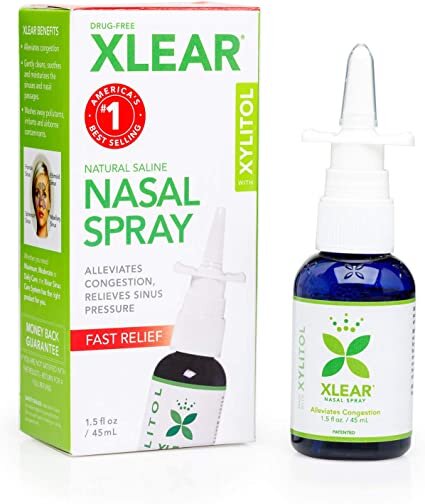
-
Probiotics
Daily Probiotics have been shown to be effective in treatment (article) and prevention (article)
-
VitaminD
Vitamin D, a critical vitamin for immune system function is found in Eggs, Salmon, Cod Liver Oil, Tuna, Sardines. Emerging evidence shows Vitamin D to increase the effectiveness of nasal corticosteroids in those suffering from Allergic Rhinitis (allergic runny nose) (article)
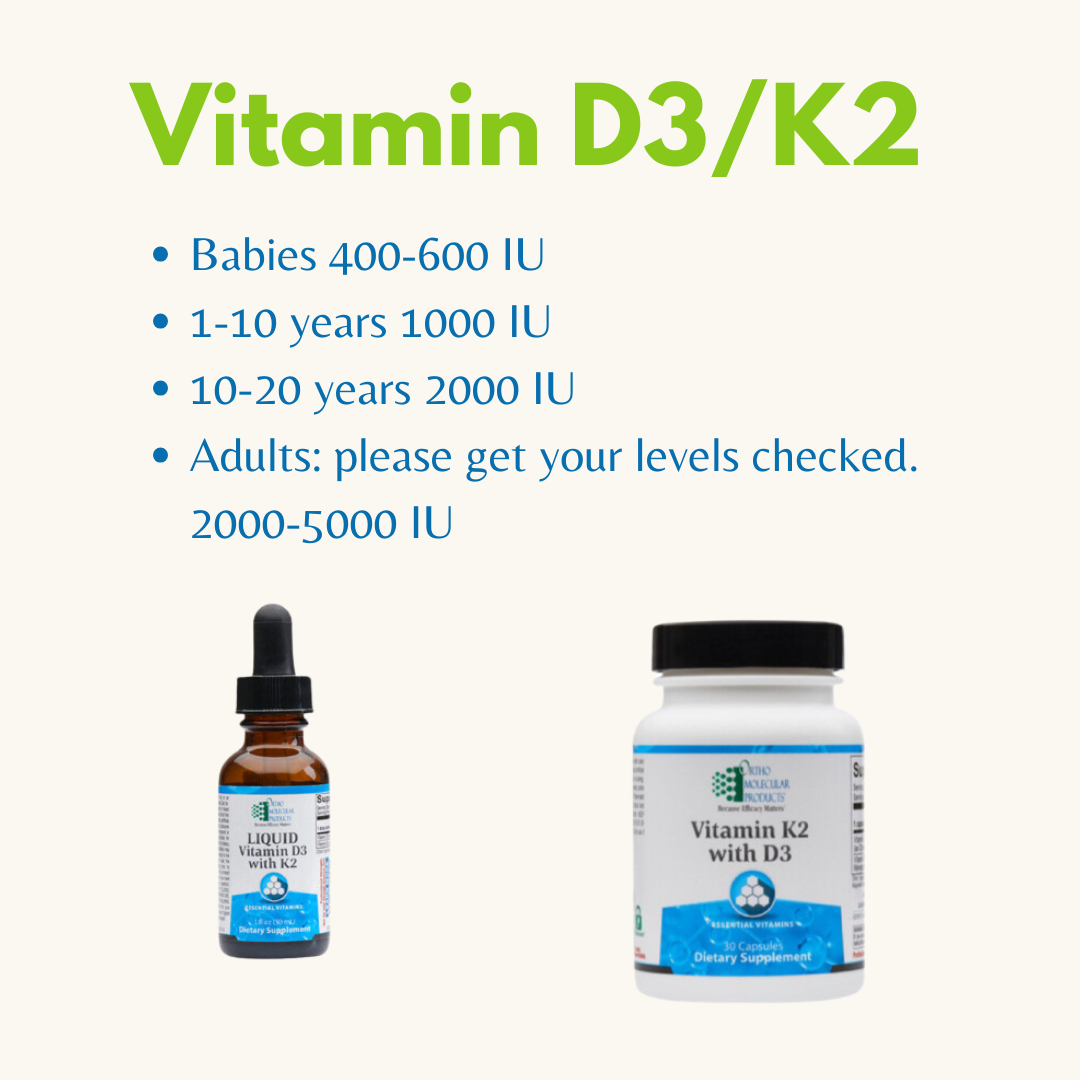
-
Juice Plus
Juice Plus, are fruits and vegetables in gummies or capsules. Organically grown, dye free, chemical free. Several studies have been conducted and show improvement in Immune System Function (article)
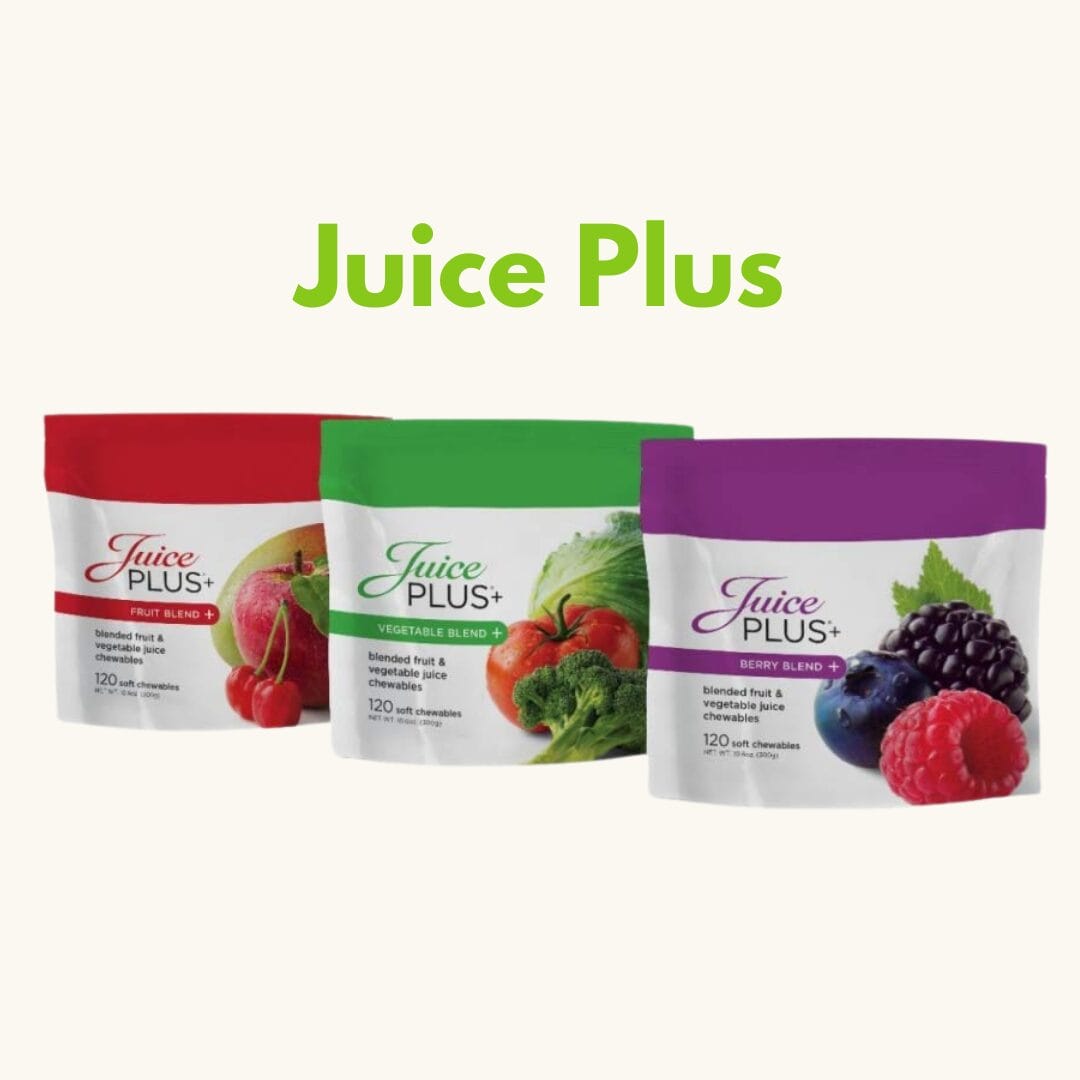
-
Quercetin
Quercetin is a natural bioflavonoid found in plants such as apples, berries, capers, grapes, onions, shallots, tea, and tomatoes, many seeds and nuts. It stabilizes mast cells, preventing release of histamine. As a potent antioxidant, it reduces inflammation. It is best used as a long term remedy starting about 4-6 weeks before allergy season. (article)
-
Nettle Leaf
Nettle Leaf, a natural antihistamine that naturally blocks the body’s ability to produce histamine. It grows in many places and can be made in to a tincture or tea. For allergy relief, capsules made from dried nettle leaves are the easiest and most effective option (article). It should be used long term, staring 4-6 weeks before the start of allergy season.
Both of these are found in D-Hist Jr and D-Hist Natural. A loading dose is required for this supplement to have it’s maximum effect.
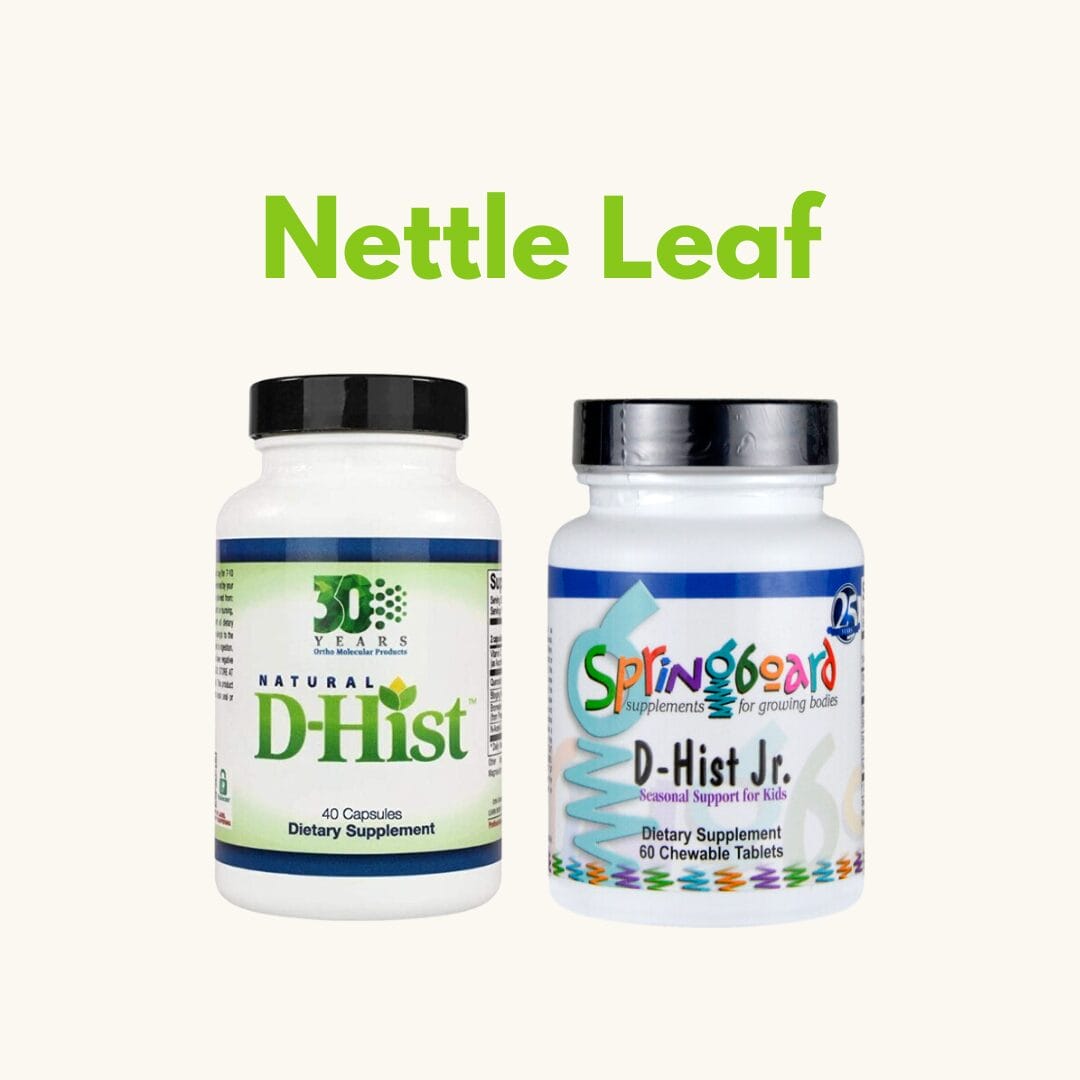
-
Vitamin C
Vitamin C, an antihistamine, is one of the most important antioxidants and immune enhancing nutrients to an allergy sufferer. Found in Red Peppers, Oranges, Kiwi, Melons. The effect of Vitamin C is enhanced when taken with Quercetin (article)

-
Honey
Local Raw Honey, in those older then 12months old, has shown promise in the prevention of Seasonal Allergies (article). Honey ingestion is thought to help via Oral Sensitization. In other words, eating the allergen regularly can help the body recognize the specific allergen as a non threat. It is important to buy the honey locally, because pollen from Brazil won’t help much in North Carolina. The only exception is Manuka Honey from New Zealand due to it’s antibacterial, antimicrobial, and immune system boosting properties. Furthermore, make sure it’s raw. Processing destroys most of the nutrients.
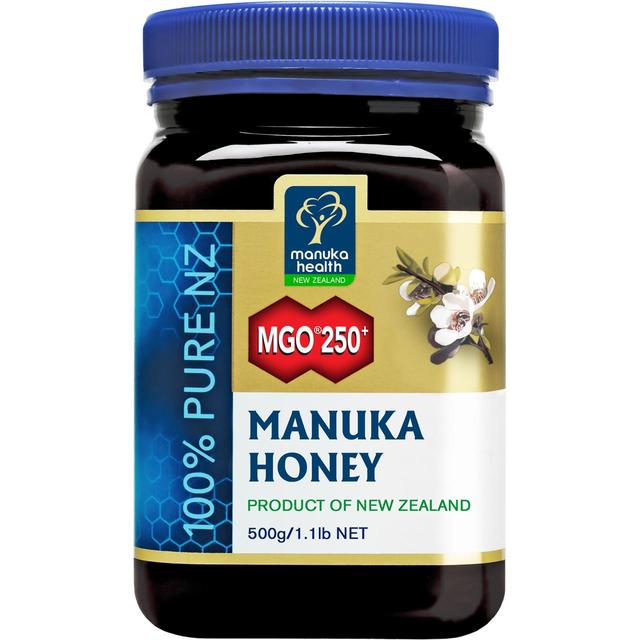

-
Omega3
Omega-3 is found in Salmon, Free Range Eggs, Free Range Grass Fed Meats, Avocado, Olive Oil, Nuts. It has been shown to boost the immune system (article)
In Great Health,
Ana-Maria Temple, MD
Found this post helpful? Save for later!


 e foot of the bed.
e foot of the bed.




